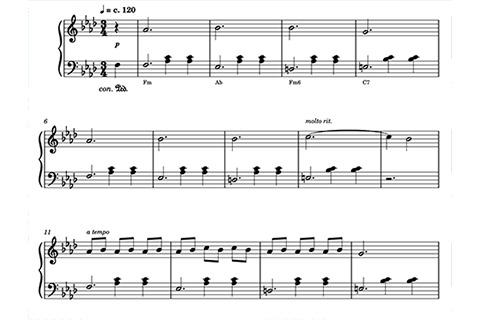A Waltz Study in F minor is a short waltz I put together over the course of just under two hours last Sunday (9 Oct 2022) afternoon.
You can download the score as a PDF:
Alternatively the MCSZ is available on MuseScore if you want to edit it: A Waltz Study in F minor.
In a recent review of my familiarity with different scales I realised I am particularly weak in A♭, which is a bit of a problem as it features in the Trinity grade I am currently studying.
I set about to write a short study piece in A♭.
Prior to my music studies I had always written waltzes off as middle of the road schmaltz that belongs in old films. I had no idea how diverse the genre was nor did I understand how there are several contemporary pieces that I quite enjoy that are waltzes.
Rhythmic ideas are definitely not my strong suit and so sticking to a highly prescriptive style such as a waltz really helps lighten the compositional workload.
In terms of what goes through my head while writing something like this, I have some guidelines that I use:
- I generally try and stay away from root chords..
- I resist trying to modulate between the basic majors.
- Given the choice, I’ll probably choose a minor key over a major.
- I generally modulate between major and minor keys.
- The circle of fifths is an indispensable guide that I keep open at all times. I constantly refer back to it for what is and is not allowed when modulating between keys.
- I have found that I generally like an inversion spread across octaves. I also like thirds spread over octaves (i.e. G2+B3) as it creates a resonance that I find quite pleasing.
- My teacher observed that the contemporary classical pieces that I like are always full of space. I have adopted that as a part of my own style. I really don’t like ”busy” classical music (i.e. Yuja Wang).
- I like a bit of syncopation.
- I particularly like leading into a melodic device from the last part of the previous bar. I notice this in a lot of EDM I enjoy. A good example of this is the vocal track in the Spencer Brown remix of Will We Remain?
For the left hand, I started with A♭ second inversion and experimented with keys local to it on the circle of fifths. Somewhere along the way I ended up making Fm root the start of the chord progression – and in doing this I completely lost sight of the original goal to create a piece in A♭. I’ll give myself half marks at least for sticking to the relative minor.
I ended up settling on: Fm -> A♭ -> Fm6 -> C7 and just cycle through that for the entire piece.
Once the chord progression was laid down I moved on to the melody.
There is nothing sophisticated about what I’ve written here. The melody is entirely diatonic to Ab/Fm and just wanders around the first five scale degrees of Fm. It is repetitious, but in a good way. Guy Michelmore has a great video on composition in which he talks about repetition and variation.
I posted a draft to the Piano Learning Adults of YouTube and @mel_lem provided some commentary that led to a few modifications, mostly around the subkey to use for the fourth chord. I ended up going in a different direction to her suggestion but it was thoughtful and helpful feedback. She also pointed out the piece was not in A♭. 😳
I was in two minds about resolving the piece on A♭ but ultimately stuck with it as it gives it an ever so slightly unfinished, but positive/uplifting tone for the final resolution.
I reviewed the score with my teacher and she suggested repeating the main motif again one octave higher, which I took onboard and added. I do feel a bit like I am abusing copy and paste but when you pull apart a famous piece like Comptine d’un autre été, l’après-midi you realise that repetition and variation is everywhere.
So that’s it in a nutshell. I enjoyed putting this together and would love to see your interpretation of it.
I will endeavour to compose things more frequently than once per year. 😃
